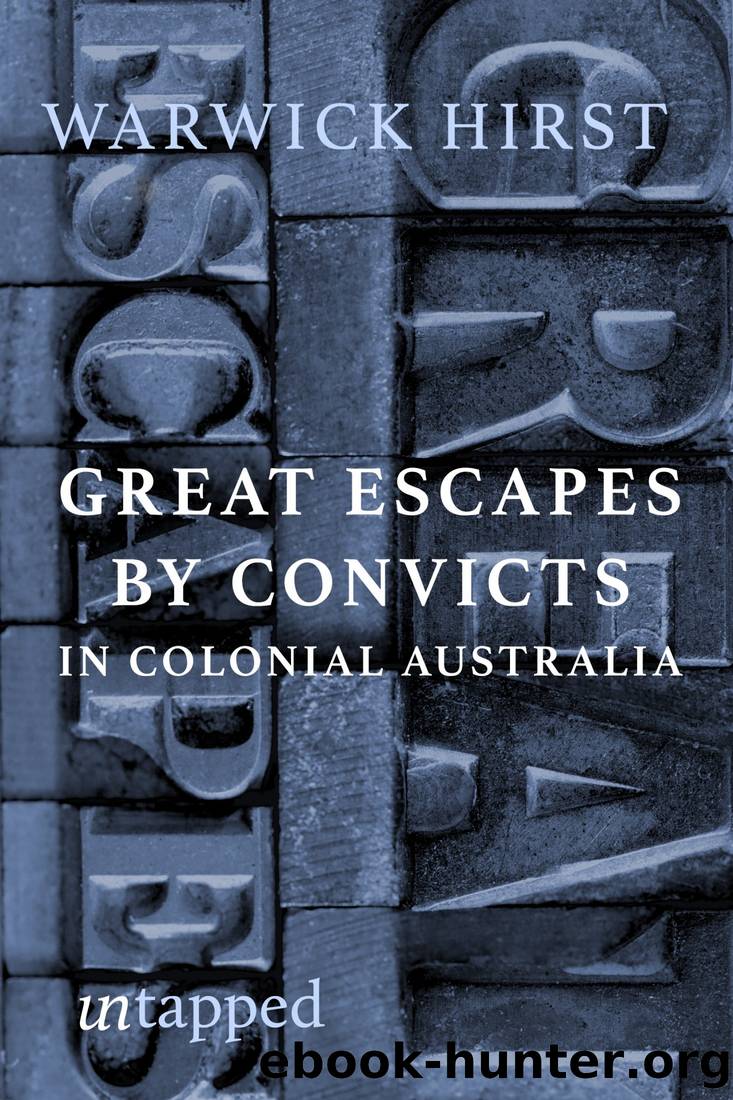Great Convict Escapes in Colonial Australia by Warwick Hirst

Author:Warwick Hirst [Hirst, Warwick]
Language: eng
Format: epub
ISBN: 9781922730688
Publisher: Ligature
Published: 2021-11-17T00:00:00+00:00
6
The Gentleman Bushranger
From the earliest days of settlement, many of those convicts who escaped into the interior managed to survive by turning to banditry. In December 1791 Captain Watkin Tench noted in his journal that âthere are at this time not less than thirty-eight convict men missing, who live in the woods by day, and at night enter the different farms and plunder for subsistenceâ.189 Six years later the problem had become serious enough for a shipment of arms to be ordered from England for the use and defence of settlers in remote regions.190 By the turn of the century a new word had been coined to describe these maraudersââbushrangersâ.
In Van Diemenâs Land, the repository for some of the most hardened types, the bushranger problem was particularly grave. The first settlement there had been established at Hobart in 1803 and only four years later Governor William Bligh was expressing dismay at the number of escaped convicts infesting the interior. He hoped that âby vigilance and Bribes they may be laid hold ofâ.191 However, by 1814 the situation had failed to improve. A worried Lachlan Macquarie (Blighâs successor) reported that in the vicinity of Port Dalrymple and elsewhere âsome very violent excesses have been lately committed by bands of run-away Convicts [who] support themselves by plundering Houses, and driving off the cattle of the unfortunate settlersâ.192 His solution was to offer an amnesty to all those âprolifigate and disorderly personsâ who surrendered before 1 December that year. An unforeseen effect was that not only did it offer a pardon for past crimes but also granted a licence to ravage the colony until the expiry date. In the end, few bushrangers surrendered, and in desperation Lieutenant-Governor Davey, against Macquarieâs wishes, proclaimed martial law. But with insufficient troops to enforce it, this measure proved almost as ineffective. Among the crags and shadowy gorges of the Tasmanian wilderness the bushrangers were secure. Their sympathisers, with whom they traded kangaroo meat for grain and sugar, provided them with shelter and gave early warning of the thinly stretched patrols of redcoats.
In time the convict-turned-bushranger was elevated in popular sentiment to the status of folk hero and celebrated in ballads as the victim of injustice and the cowardly police. The model for this figure of romance was a freckle-faced, blue-eyed Irish killer named John Donahue. He arrived in Sydney in 1825 on a life sentence. He was soon at large embracing a career of highway robbery and murder. His luck ran out in 1830 when he was tracked to his lair at Bringelly (outside Sydney) and shot dead. It was not long before a sanitised version of his short, violent life was being sung around lonely campfires and in the teeming public houses of the towns. âBold Jack Donahueâ, as he was now known, had been transformed by the balladeer into one of those:
gallant bushrangers who gallop on the plain
Who scorn to live in slavery and wear the iron chain.
As a promotion for the bushranging way of
Download
This site does not store any files on its server. We only index and link to content provided by other sites. Please contact the content providers to delete copyright contents if any and email us, we'll remove relevant links or contents immediately.
The Memory Code by Lynne Kelly(2401)
Schindler's Ark by Thomas Keneally(1884)
Kings Cross by Louis Nowra(1797)
Burke and Wills: The triumph and tragedy of Australia's most famous explorers by Peter Fitzsimons(1426)
The Falklands War by Martin Middlebrook(1383)
1914 by Paul Ham(1345)
Code Breakers by Craig Collie(1252)
A Farewell to Ice: A Report from the Arctic by Peter Wadhams(1248)
Paradise in Chains by Diana Preston(1247)
Burke and Wills by Peter FitzSimons(1237)
Watkin Tench's 1788 by Flannery Tim; Tench Watkin;(1232)
The Secret Cold War by John Blaxland(1213)
The Protest Years by John Blaxland(1205)
THE LUMINARIES by Eleanor Catton(1195)
30 Days in Sydney by Peter Carey(1160)
Lucky 666 by Bob Drury & Tom Clavin(1155)
The Lucky Country by Donald Horne(1140)
The Land Before Avocado by Richard Glover(1119)
Not Just Black and White by Lesley Williams(1085)
